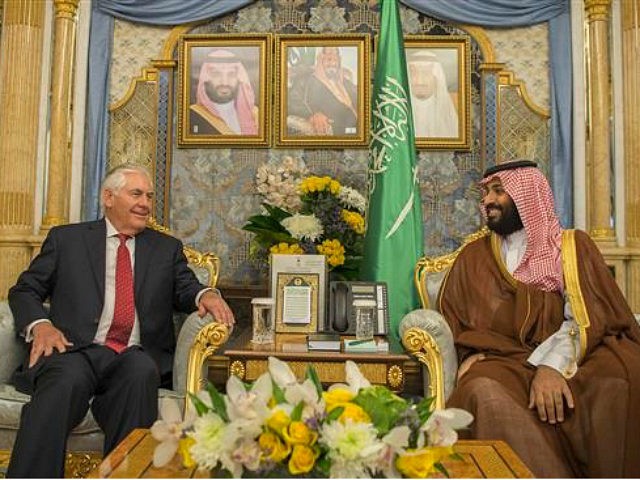Secretary of State Rex Tillerson spent Tuesday in Qatar after holding meetings in Saudi Arabia and Kuwait to resolve the Gulf diplomatic crisis. As of yet, there has been little sign of progress from Tillerson’s extended mission to the Middle East, although the Saudi royal family thanked him for his efforts.
Tillerson is now shuttling back and forth between Jeddah and Doha. While in the Qatari capital, he signed a memorandum of understanding between the United States and Qatar about combating terrorism, but Qatar’s antagonists in Saudi Arabia, Egypt, Bahrain, and United Arab Emirates were not much reassured by the agreement.
The other Gulf states issued an extensive series of demands to Qatar last month. Qatar passed both an original an extended deadline for compliance, while the other states have resisted all entreaties to compromise on the conditions. One of the demands was for Qatar to shut down Turkey’s military base in the country, but instead, a fresh load of Turkish troops arrived on Tuesday.
Another demand was for Qatar to shut down the vast Al-Jazeera news network. The U.N. and various human rights advocates have denounced this demand as offensive to free expression, but the foreign minister of the United Arab Emirates just sent a letter to the U.N. High Commissioner for Human Rights arguing that Al-Jazeera has “repeatedly crossed the threshold of incitement to hostility, violence, and discrimination.”
UAE media minister Noura al-Kaabi repeated those charges to the UK Guardian on Wednesday, accusing Al-Jazeera of having “blood on its hands” because it has given an influential media platform to “some of the most dangerous terrorists in the world.” The UAE even produced a video that accused Al-Jazeera of helping to radicalize one of the perpetrators of last month’s Borough Market attack in London.
Tillerson nevertheless insisted Qatar is being “reasonable” and wishes to “take things forward,” touting its memorandum of understanding with the United States as a landmark achievement almost a year in the making that will “disable terror financing flows and intensify counter terrorism activities globally.”
To put it bluntly, the other Gulf states simply do not trust the word of Qatar’s government, so they seek tangible concessions that will reduce the emirate’s ability to destabilize their politics, support terrorism, and provide assistance to the aspiring regional hegemons in Ankara and Tehran.
The UAE’s Al-Kaabi put it in exactly those words to the Guardian: “We have lost trust with the government of Qatar. The difficulty is that it is one thing to sign an agreement, but the true test is whether it is ever enforced. An agreement is not an agreement if it is not honored.”
Another twist in the story is the revelation by the anti-Qatar coalition that Qatar secretly signed agreements in 2013 and 2014 that required it to carry out many of the steps included in the current list of 13 demands, including an end to its support for the Muslim Brotherhood. These documents are seen as crucial to understanding the swiftness and severity of the coalition’s actions against Qatar.
The coalition sees its new list of demands as a more severe, and immediately verifiable, version of the agreements Qatar has already failed to meet. For example, in the 2013 secret document, all of the signatories agreed not to support “antagonistic media,” which is taken as a euphemistic reference to Al-Jazeera. The later 2014 agreement mentioned Al-Jazeera by name and obliged Qatar to keep the network from undermining the Egyptian government.
Qatar responded to the leak of these secret documents by noting that all of the signatories agreed to abide by its provisions and accusing Saudi Arabia and the UAE of violating “the spirit of the agreement” first.
The Washington Post found little evidence that the boycott of Qatar has significantly damaged its standard of living:
High-end clothing stores hawk the latest summer trends. Grocery stores are brimming with meats and cheeses from Europe and Turkey, and just last month the country’s main port received 4,300 cars and sheep from Australia.
Luxury hotels like the W and St. Regis serve lavish meals around the clock and alcohol flows for visitors. Famous Barcelona soccer players Gerard Pique, Sergio Busquets and Jordi Alba met with fans last week at a mall in the capital, Doha, which will host the 2022 World Cup tournament.
“We don’t feel any difference. It’s a celebration everywhere,” Qatari Badr Jeran said as he shopped at the mall.
In short, Qatar has tremendous oil wealth, plus allies in Iran, Turkey, and Morocco willing to keep it supplied with essential goods. Iran is even helping Qatari jet-setters avoid undue inconvenience by opening its airspace. In the absence of a full military blockade, Qatar has been able to open new shipping lanes to work around closed ports in the other Gulf states.
The CEO of Qatar Airways felt free to insult “crap American carriers” where travelers are “served by grandmothers” during a speech in Dublin last week, although he later apologized after a storm of criticism over his “misogyny and discrimination.”
In other words, there is little sign that Qatar feels intimidated, or that the other Arab states feel conciliatory, so Secretary Tillerson has his work cut out for him.

COMMENTS
Please let us know if you're having issues with commenting.